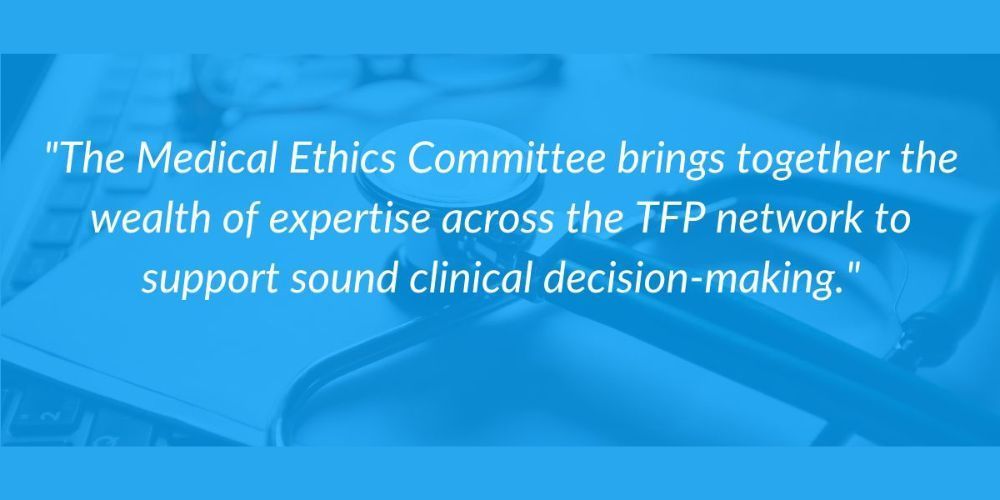A Unique Collaborative Model That Enhances IVF Practitioners' Capacity to Resolve Ethical Issues
The Fertility Partners Medical Ethics Committee (MEC) is a unique platform that provides our partner clinics with timely and valuable guidance on ethical issues arising in practice, and helping support sond clinical and organizational decision-making. The Committee's services include case consultation, policy development, and education.
Read below an article written by Dr. Shawn Winsor that describes how the MEC enhances IVF practitioners' capacity to resolve ethical issues through a collaborative model that is unique in North America.
Healthcare organizations have always been institutions of learning as much as they are of innovation, research, and clinical care. From the time of the first hospital in Baghdad in the 9th century to the advent of modern medicine in the 19th, each generation of practitioners builds on the knowledge of their predecessors. The goal of this evolutionary process has been to clinically improve patient health. In 1961, however, something changed. The invention of the dialysis machine necessitated the creation of a committee to determine who of the many candidates would get this life saving treatment and who would not. Patient treatment would no longer be evaluated strictly on medical or scientific grounds.
After a period through the 1970s and into the 1990s when ethical debates shifted to courtrooms in the adjudication of end-of-life cases, healthcare organizations and clinicians became increasingly aware that ethical issues in healthcare delivery and practice were, in fact, common, and not just limited to life or death decisions. Clinical specialties started to codify practice-specific expectations and ethical standards. Healthcare organizations recognized that it is not just individuals who have values but that institutions also reflect a set of ethical norms in their mission, operation, decisions and everyday activities. Spurred by the patient rights movement, healthcare organizations developed patient ‘bill of rights’ and incorporated ethics committees as a resource for their clinicians and patients.
Now, well into the 21st century, accreditors, regulators, funding bodies, health professional associations, and educational institutions all have robust expectations and in many instances requirements that ethics standards and decision frameworks be integrated into codes of practice. Ethical decision-making is understood to occur at all levels of healthcare, from the boardroom to the bedside, and ethics programs are commonplace in academic teaching centres and, increasingly, in large community hospitals. Specialty areas that operate in comparatively small clinic environments, however, have been slow to catch up. Such is the case with Assisted Reproductive Technology (ART), despite the rich ethical terrain it covers: genetic and chromosomal screening, fertility preservation, surrogacy, embryo disposition, third party donation, priority setting and resource allocation, and donor compensation to name some of its challenges.
Rather than seeing this as a weakness, The Fertility Partners (TFP) saw it as an opportunity. It recognized the wealth of clinical expertise and experience in the TFP network of 13 IVF centres (plus over 20 satellite locations) and under the leadership of Shawn Winsor, Al Yuzpe, and Dan Nayot created a Medical Ethics Committee (MEC) that is unique in North America both for its structure and the size of the network it encompasses. Each partner clinic within the network is represented on the MEC, as is each key professional role within them: reproductive endocrinology and infertility (REI) physician specialist, nurse, embryologist, lab director, administrator, genetics counsellor, fertility counsellor, lawyer, ethicist, and patient advocate.
The MEC’s objectives are to:
· Help resolve ethical issues that arise in clinical and organizational practice;
· Support sound clinical and organizational decision-making by TFP employees and partners;
· Enhance ethics capacity throughout the organization to determine what matters most in providing care when it matters most; and
· Establish TFP network partners as leaders in ethical practice.
Each of these deliverables aligns with the TFP mission and vision: drive the global profession forward, deliver operational excellence, empower and enable partners in pursuit of world best clinical outcomes, and provide exceptional and enhanced patient experience. The MEC achieves its objectives by providing consultation and review of challenging ethical cases, development and review of ethics-relevant policies and guidelines, and ongoing education of MEC members and TFP physicians and employees.
Sixty years of ethics committee functioning has shown what makes such committees successful. They have strong support from organizational leadership and are integrated into the organization. They have experienced internal leadership both in ethics and administration. There is broad organizational awareness of and engagement with the committee. Committee members are multidisciplinary, have training in ethics, and able to meet their obligations. Finally, the committee is pro-active in delivering on its objectives and accountable for its outcomes.
The period from start-up to maturity for an ethics committee is typically well over a year. The MEC was launched in January 2023 and has had high impact already in its six months with eight case consultations and one policy consultation. Issues it has addressed include sex selection, intrafamilial and intergenerational donation, high BMI patients, truth telling and confidentiality, and determining priority access to limited IUI resources. The Committee’s success over those six months is a reflection not only on TFP leadership but on partner clinics’ collaborative commitment to the MEC vision, its leadership, and its members.
Dr. Kristy Cho, Gynecologist and Fertility Specialist at Olive Fertility Centre, Vancouver, referred a case to the MEC in June. In describing the experience, she said that “The MEC is an excellent resource for clinicians. It was very helpful to have a multidisciplinary team discuss a complicated and unusual case, review the recommendations, and answer any outstanding questions we had. Many patients present with unique social situations and this is a great platform to determine if a management consensus can be reached.”
